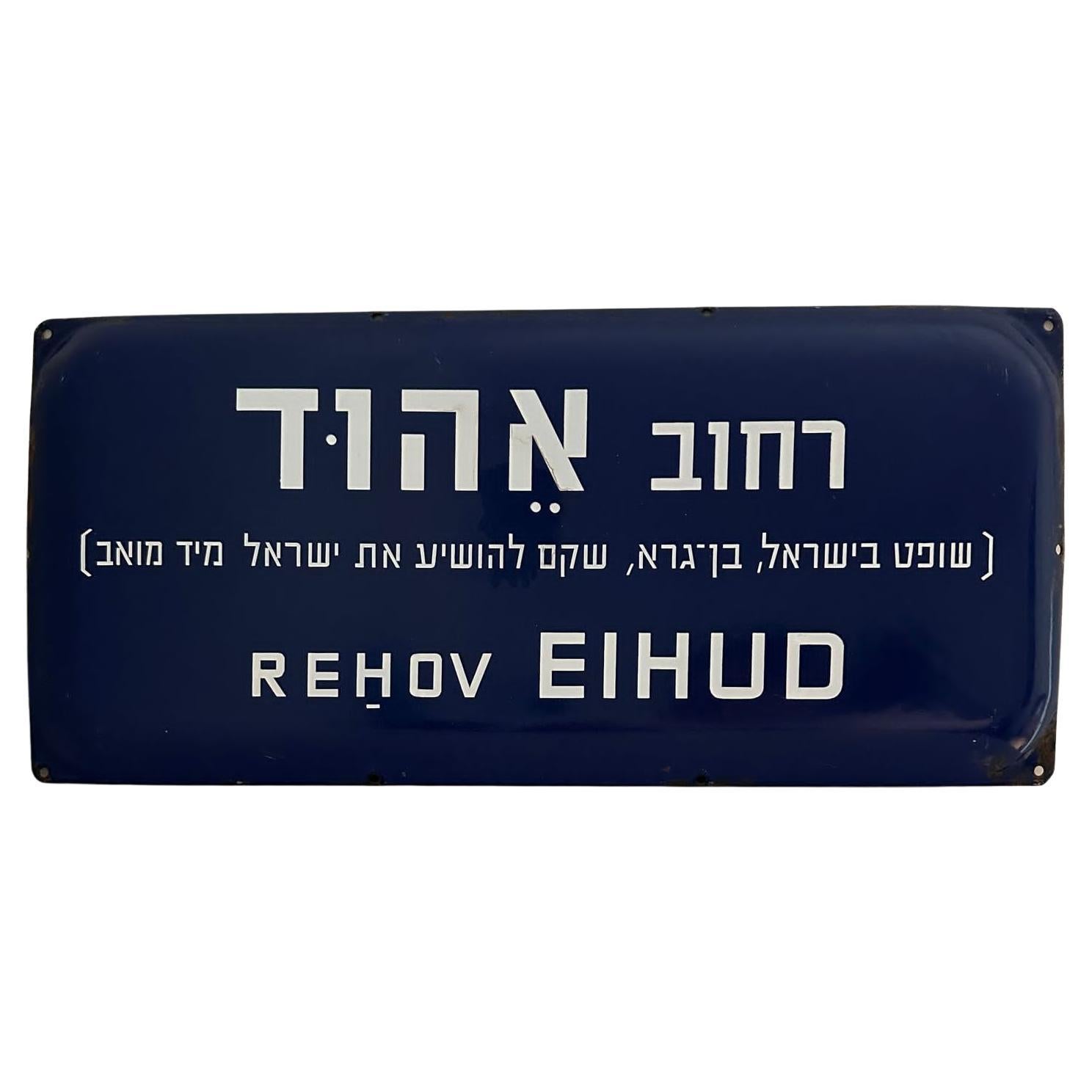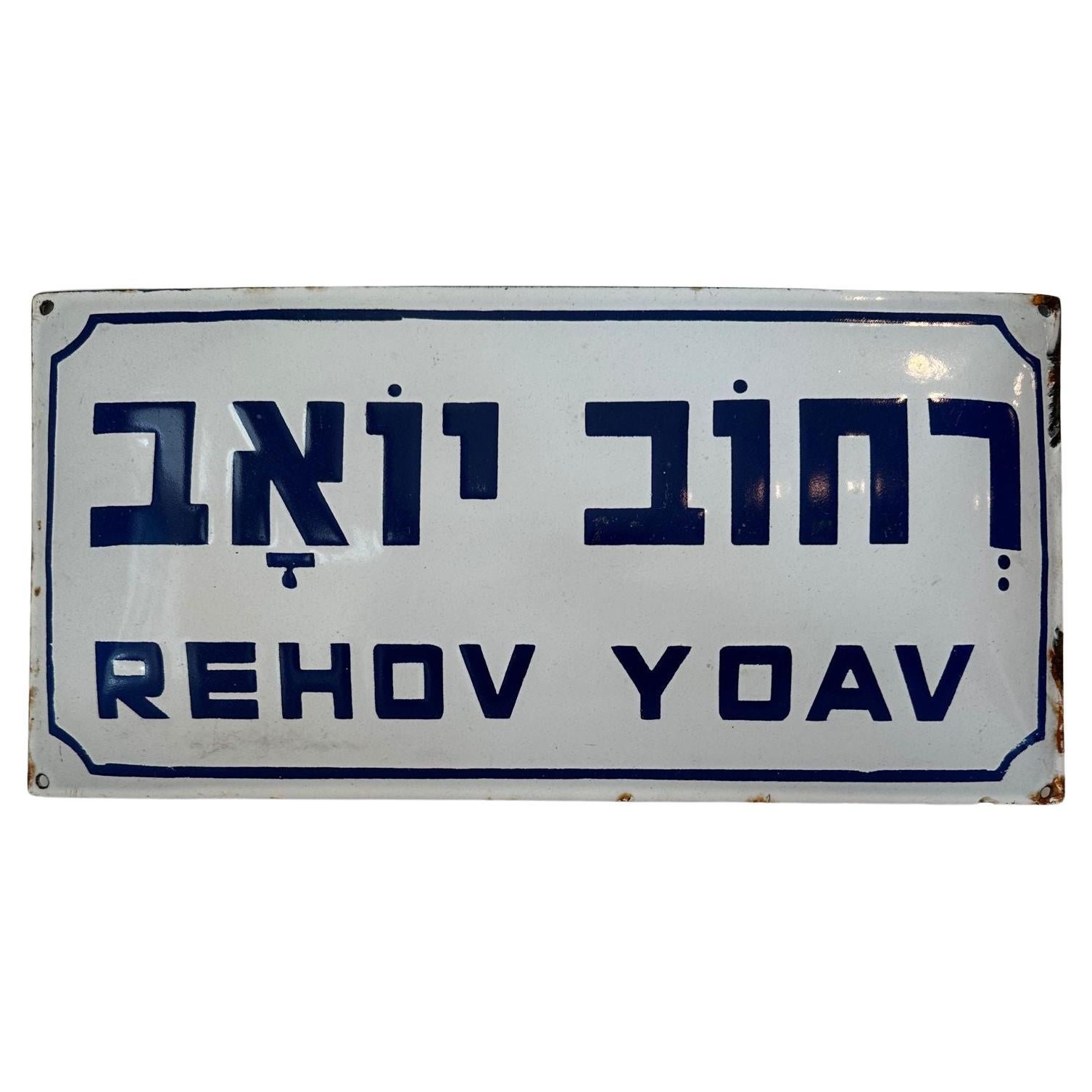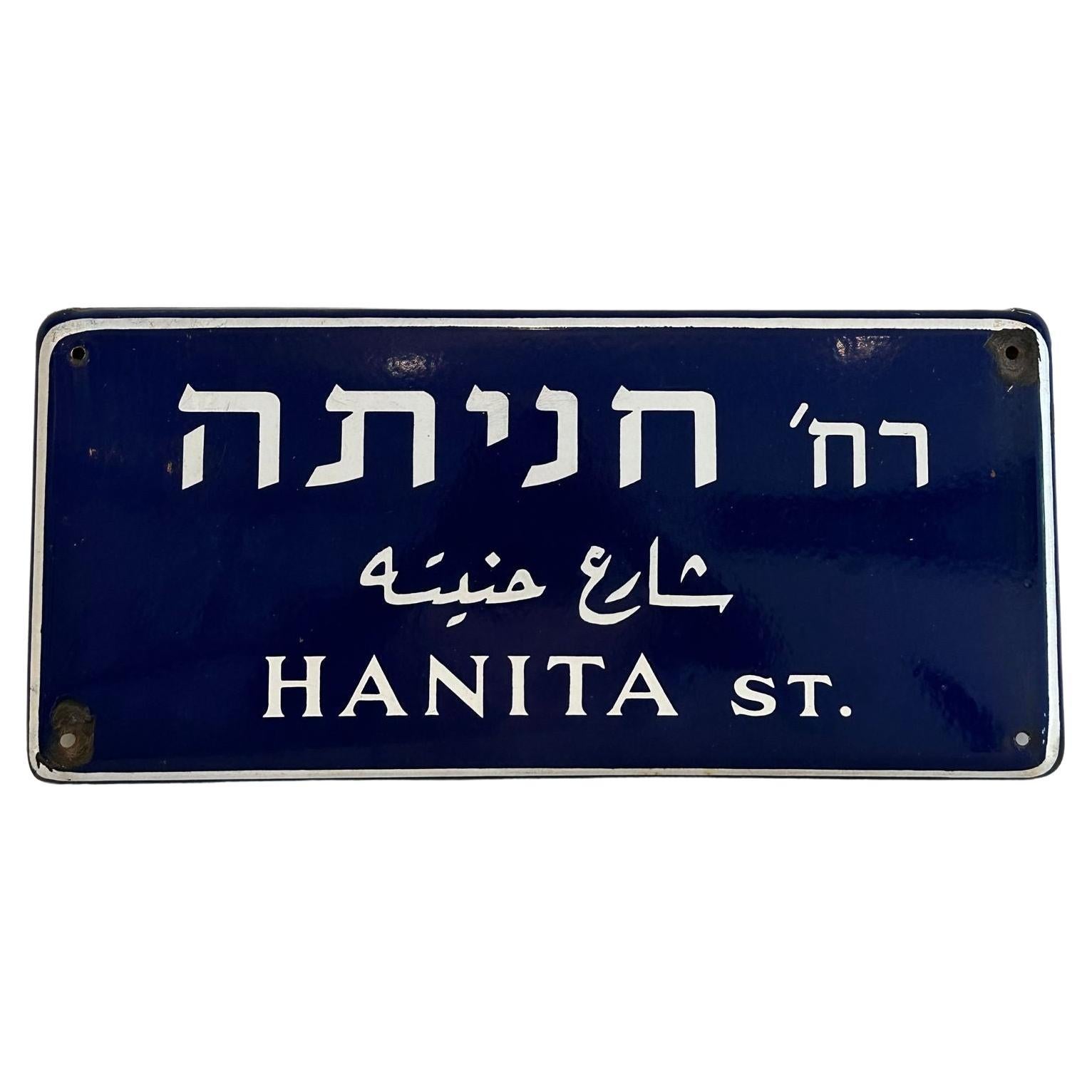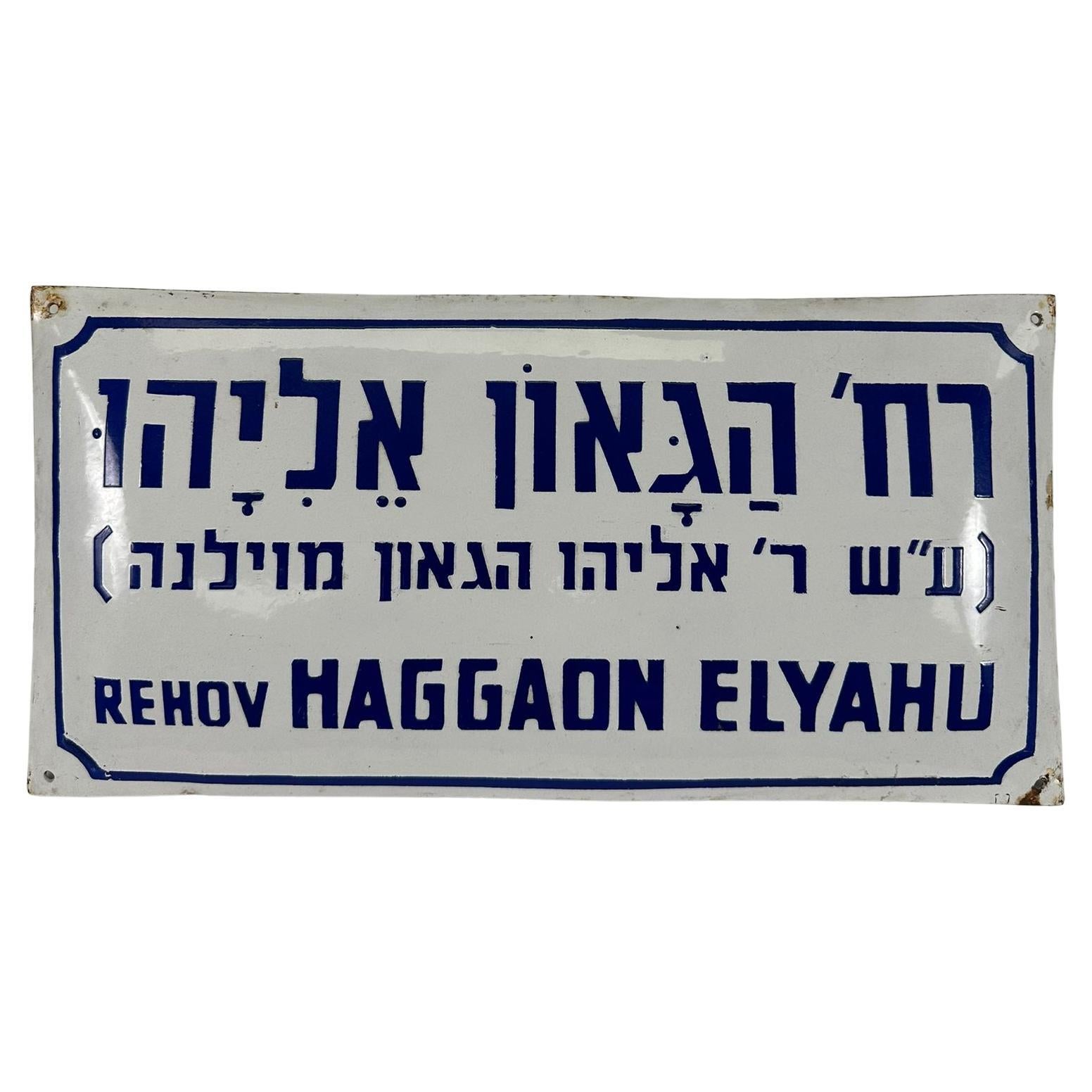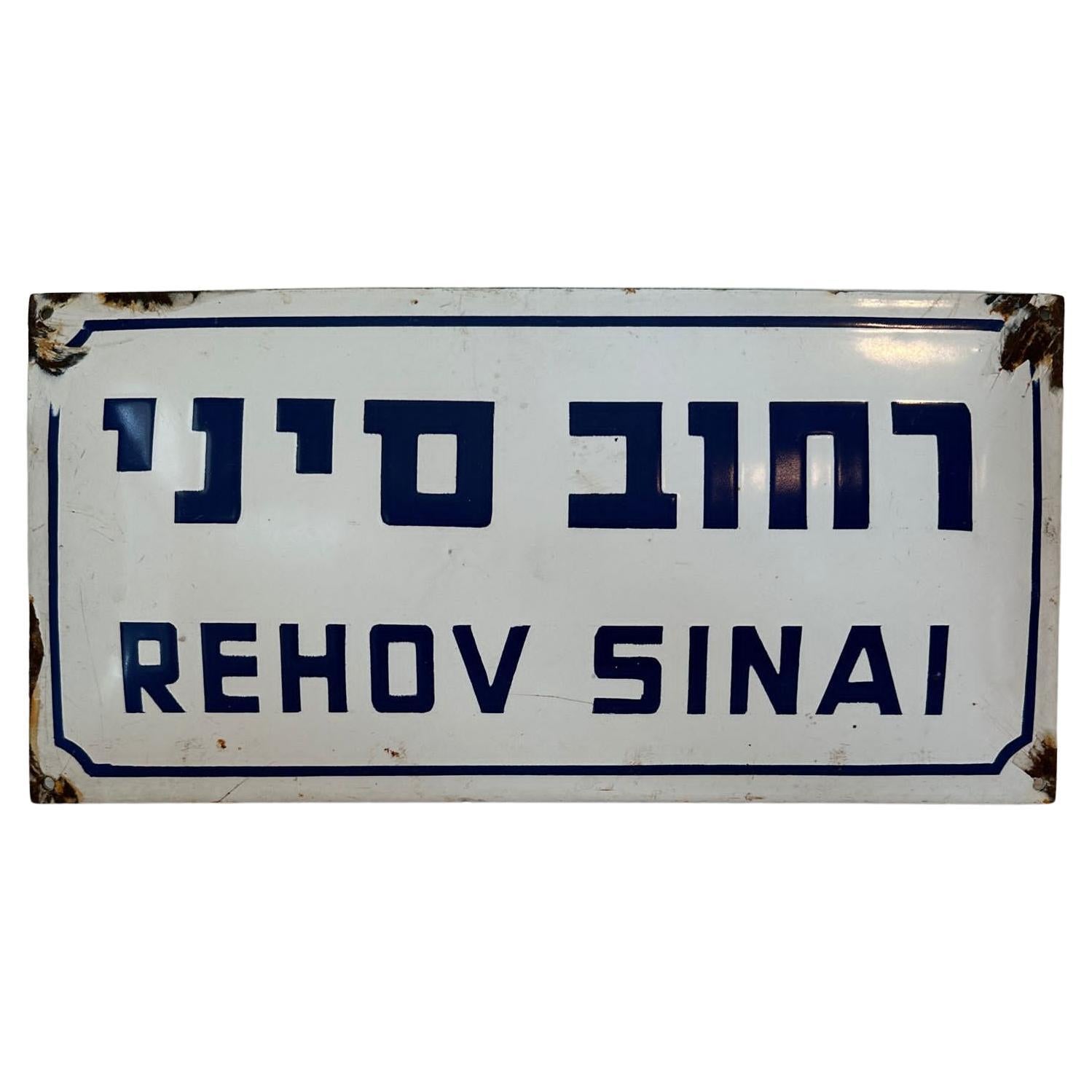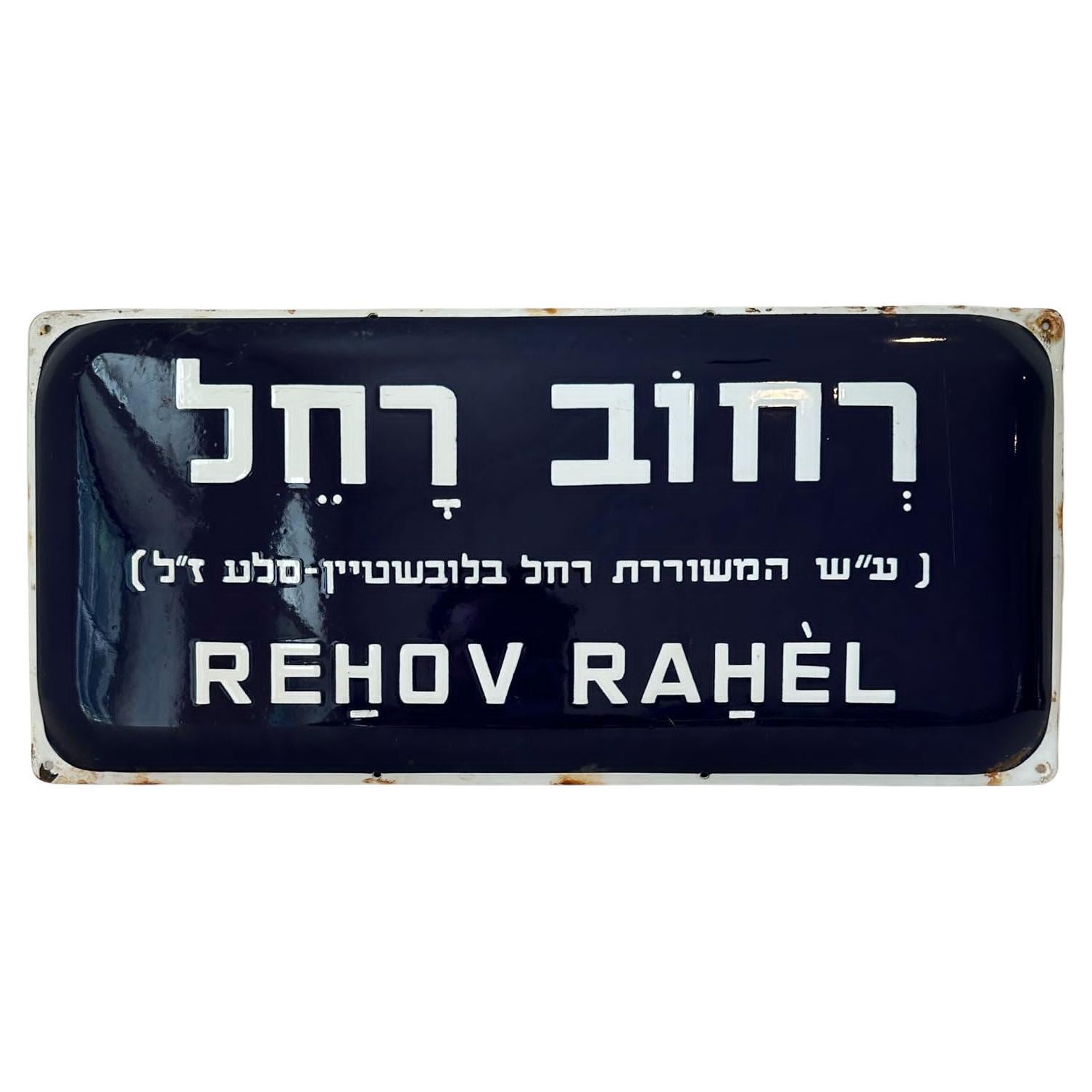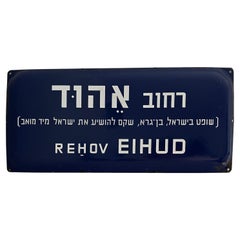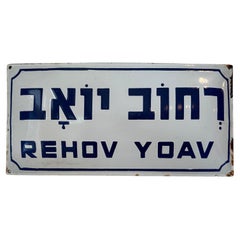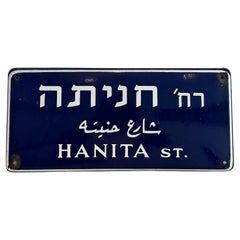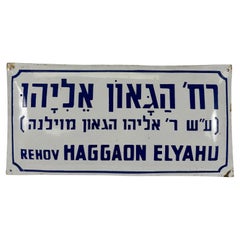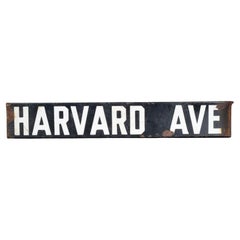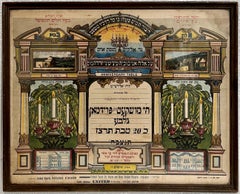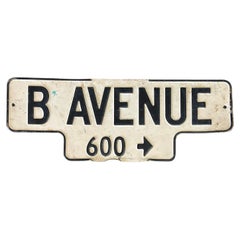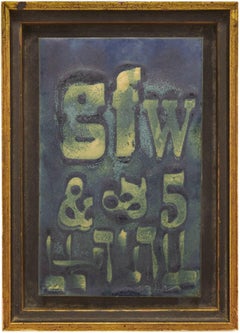Items Similar to Mid-20th Century Enamel and Iron Israeli 'Eliyahu Hannavi' Street Name Sign
Want more images or videos?
Request additional images or videos from the seller
1 of 7
Mid-20th Century Enamel and Iron Israeli 'Eliyahu Hannavi' Street Name Sign
$1,440
$1,80020% Off
£1,081.77
£1,352.2120% Off
€1,247.45
€1,559.3220% Off
CA$1,998.19
CA$2,497.7320% Off
A$2,220.43
A$2,775.5320% Off
CHF 1,163.53
CHF 1,454.4120% Off
MX$27,229.59
MX$34,036.9820% Off
NOK 14,840.12
NOK 18,550.1520% Off
SEK 13,961.04
SEK 17,451.3020% Off
DKK 9,310.47
DKK 11,638.0920% Off
Shipping
Retrieving quote...The 1stDibs Promise:
Authenticity Guarantee,
Money-Back Guarantee,
24-Hour Cancellation
About the Item
Mid-20th century handmade Israeli street name sign. Made of enamel and iron, this street sign was created shortly after the establishment of the state of Israel in 1948. The sign is written in bolt white letters over a dark blue background, alluding to the colors of the national flag of the newly established state.
The sign names the street 'Eliyahu Hannavi' (Eliyahu the prophet) in Israel, in both Hebrew and English letters (in transliteration).
Eliyahu, (Elijah) was one of the most important and well-known prophets in Judaism. He is considered the prophet who led the rebellion against foreign labor, and to this day he has a part in important customs in the Jewish tradition, such as the cup for Elijah the prophet on Seder night or the throne for Elijah the prophet at the circumcision ceremony.
The name Eliyahu consists of a combination of the words "Eli" and "he" - meaning God is my God, he and no other.
Every item in Menorah Galleries is accompanied by a lifetime “Certificate of Authenticity” and additional documentation and information regarding the individual artifact and its culture.
- Dimensions:Height: 8.5 in (21.59 cm)Width: 19 in (48.26 cm)Depth: 1 in (2.54 cm)
- Style:Mid-Century Modern (Of the Period)
- Materials and Techniques:
- Place of Origin:
- Period:
- Date of Manufacture:Circa 1950
- Condition:Wear consistent with age and use.
- Seller Location:New York, NY
- Reference Number:1stDibs: LU5281235292152
About the Seller
5.0
Recognized Seller
These prestigious sellers are industry leaders and represent the highest echelon for item quality and design.
Established in 2006
1stDibs seller since 2020
130 sales on 1stDibs
Typical response time: Several days
- ShippingRetrieving quote...Shipping from: New York, NY
- Return Policy
Authenticity Guarantee
In the unlikely event there’s an issue with an item’s authenticity, contact us within 1 year for a full refund. DetailsMoney-Back Guarantee
If your item is not as described, is damaged in transit, or does not arrive, contact us within 7 days for a full refund. Details24-Hour Cancellation
You have a 24-hour grace period in which to reconsider your purchase, with no questions asked.Vetted Professional Sellers
Our world-class sellers must adhere to strict standards for service and quality, maintaining the integrity of our listings.Price-Match Guarantee
If you find that a seller listed the same item for a lower price elsewhere, we’ll match it.Trusted Global Delivery
Our best-in-class carrier network provides specialized shipping options worldwide, including custom delivery.More From This Seller
View AllMid-20th Century Enamel and Iron Israeli 'Eihud' Street Name Sign
Located in New York, NY
Mid-20th century handmade Israeli street name sign. Made of enamel and iron, this street sign was created shortly after the establishment of the state of Israel in 1948. The sign is ...
Category
Vintage 1950s Israeli Mid-Century Modern Decorative Art
Materials
Enamel, Iron
$1,440 Sale Price
20% Off
Mid-20th Century Enamel and Iron Israeli 'Yoav' Street Name Sign
Located in New York, NY
Mid-20th century handmade Israeli street name sign. Made of enamel and iron, this street sign was created shortly after the establishment of the state o...
Category
Vintage 1940s Israeli Mid-Century Modern Decorative Art
Materials
Enamel, Iron
$1,440 Sale Price
20% Off
Mid-20th Century Enamel and Iron Israeli 'Hanita' Street Name Sign
Located in New York, NY
Mid-20th century handmade Israeli street name sign. Made of enamel and iron, this street sign was created shortly after the establishment of the state of Israel in 1948. The sign is written in bolt white letters over a dark blue background, alluding to the colors of the national flag of the newly established state.
The sign names the street 'Hanita' in Israel, in both Hebrew and English letters (in transliteration), as well as in Arabic.
The meaning of the name 'Hanita' is double: it is both an inflection of the name Hannah and also meansm 'her spear'. A spear is an ancient weapon...
Category
Vintage 1950s Israeli Mid-Century Modern Decorative Art
Materials
Enamel, Iron
$1,440 Sale Price
20% Off
Vintage Israeli Enamel Street Sign – "Rehov HaGaon Eliyahu" (1948)
Located in New York, NY
This enamel-on-iron street sign, produced in Israel in 1948, features Hebrew and English text in a classic blue-on-white design. It marks "Rehov HaGaon Eliyahu," a street named in ho...
Category
Mid-20th Century Israeli Historical Memorabilia
Materials
Enamel, Iron
Mid-20th Century Enamel and Iron Israeli 'Sinai' Street Name Sign
Located in New York, NY
Mid-20th century handmade Israeli street name sign. Made of enamel and iron, this street sign was created shortly after the establishment of the state of Israel in 1948. The sign is ...
Category
Vintage 1940s Israeli Mid-Century Modern Decorative Art
Materials
Enamel, Iron
$1,440 Sale Price
20% Off
Mid-20th Century Enamel and Iron Israeli 'Rah'el' Street Name Sign
Located in New York, NY
Mid-20th century handmade Israeli street name sign. Made of enamel and iron, this street sign was created shortly after the establishment of the state of Israel in 1948. The sign is written in bolt white letters over a dark blue background, alluding to the colors of the national flag of the newly established state.
The sign names the street 'Ra'hel' (Rachel) in Jerusalem in both Hebrew and English letters (in transliteration).
The origin of the name Rachel comes from the book of Genesis in the Bible, where it appears as the name of a biblical figure - a shepherdess, the wife of Jacob our father, the daughter of Laban the Armenian, the sister of Leah his mother and one of the four mothers of the people of Israel. Rachel was also the mother of Joseph the righteous and Benjamin.
However, this sign refers to the poet Rahel Bluwstein, more famously known as Rachel the Poetess, who is considered the “founding mother...
Category
Vintage 1950s Israeli Mid-Century Modern Decorative Art
Materials
Enamel, Iron
$1,440 Sale Price
20% Off
You May Also Like
Antique Harvard Ave. Porcelain Sign c.1900-1910
Located in San Francisco, CA
ABOUT
An original double sided enameled porcelain Harvard Ave street sign.
Shown with life size hand model for scale.
CREATOR Unknown.
DATE OF MANUFACTURE c.1900-1900.
...
Category
Early 20th Century Industrial Signs
Materials
Enamel, Steel
Rare Palestine Antique Hebrew Judaica Yahrzeit Synagogue Sign Memorial Plaque
Located in Surfside, FL
Circa 1890-1920. This Neoclassical, Judaic, Egyptian revival, Orientalist Mizrach sign, was produced in British Mandate Palestine by the chromolithograph process at the beginning of the 20th century. It pictures vignettes of holy places. with a hand written memorial. It was for the Tzedakah charity fund for the century-old institutions in Jerusalem: The great "Torah Center Etz Chaim"; a Free Kitchen for poor children and orphans; the famous Bikur Cholim Hospital with its dispensaries and clinics and the only Home for Incurable Invalids in Eretz Israel. They also worked with Arthur Szyk and Alfred Salzmann.. The A.L. Monsohn Lithographic Press (Monzon Press, Monson Press, דפוס אבן א"ל מאנזאהן, דפוס מונזון) was established in Jerusalem in 1892 by Abraham-Leib (or Avrom-Leyb) Monsohn II (Jerusalem, c.1871-1930) and his brother Moshe-Mordechai (Meyshe-Mordkhe). Sponsored by members of the Hamburger family, the brothers had been sent to Frankfurt, Germany in 1890 to study lithography. Upon returning to Jerusalem in 1892 with a hand press, they established the A.L. Monsohn Lithographic Press in the Old City of Jerusalem. According to the Information Center for Israeli Art A.L. Monsohn "created complex decorations for documents and oriental calendars that combined the tradition of Jewish art with modern printing techniques such as photographic lithography, raised printing and gilding."
The founders of the Monsohn press produced Jewish-themed color postcards, greeting cards, Jewish National Fund stamps, and maps documenting the evolution of the Jewish settlement in Eretz Israel in the nineteenth-twentieth centuries; religious material such as decorative plaques for synagogues, portraits of Old Yishuv rabbis such as Shmuel Salant, Mizrah posters indicating the direction of prayer for synagogues, memorial posters, and posters for Sukkot booths; color frontispieces for books such as Pentateuch volumes and the early song collections of Abraham Zvi Idelsohn (e.g., Shire Zion, Jerusalem 1908); artistic wedding invitations; and labels, packaging and advertisements for the pioneering entrepreneurs of Eretz Israel. The texts appearing in the Monsohn products were in several languages: Hebrew, Arabic, Yiddish, English, German (e.g., a c1920 trilingual Hebrew-English-Arabic "Malaria Danger" broadside warning the public of mosquitoes spreading malaria). Many of the brilliantly colored postcards and maps can be seen online as can the artistic invitations to his children's weddings which Monsohn published in the Jerusalem Hebrew press.
For years, the Monsohn (later, Monson/Monzon) Press was considered the best and most innovative in the country—pioneering in such techniques as gold-embossing and offset printing, among others. Early items for tourists included collections of Flowers of the Holy Land (c. 1910–1918)—pressed local flowers accompanied by scenes from the Eretz Israel countryside and relevant verses from the Bible, edited by Jsac Chagise (or Itzhak Haggis), an immigrant from Vitebsk, and bound in carved olive wood boards. Shortly after World War I Monsohn (now spelled מונזון) used zincography to produce the prints included in the Hebrew Gannenu educational booklets for young children illustrated by Ze'ev Raban of the Bezalel Academy of Art and Design and printed in Jerusalem by Hayim Refael Hakohen (vol. 1, 1919; vols. 2–3, 1920). In 1934 Monsohn moved into the new, western part of Jerusalem, in a shop with four presses and 30 workers, including Abraham-Leib's sons, David, Yosef, Moshe and Shimon, and his daughter Raytse's husband, Abraham Barmacz. The concern did business with all sectors of the city's population, including Arabs, for whom they printed in Arabic. Among their clients were members of the Ginio, Havilio, and Elite families, and Shemen, Dubek, and other renowned national brands, manufacturing products such as wine, candies, oil, and cigarettes. They also printed movie and travel posters, and government posters, postcards and documents, hotel luggage labels...
Category
Early 20th Century Aesthetic Movement More Art
Materials
Lithograph
Vintage Metal "B Avenue" Street Sign - City of Coronado, California
Located in San Diego, CA
Super cool vintage metal "B Avenue" street sign from the city of Coronado, California, circa 1970s. The piece is in good vintage condition with a distressed patina and measures: 24"W...
Category
Mid-20th Century American Mid-Century Modern Signs
Materials
Metal
Typeface, Hebrew Font and Numbers Enamel Judaica Art Plaque
By George F Welch
Located in Surfside, FL
Dimensions w/Frame: 10" x 7 1/2" x 1 1/2"
A George F. Welch Abstract Copper Enamel Wall Art Plaque Inscribed signature on the lower right of the plaqu...
Category
20th Century Modern Mixed Media
Materials
Enamel
Historic Rare Carved memorial plaque made by Jewish internee in Cyprus, 1948
Located in Tel Aviv - Jaffa, IL
super rare and historic example of Cyprus stone carving, made by jewish holocaust surviver that was Detained at the Internment camps in Cyprus, just 3 years after the holocaust. this piece is very unusual, most of this carvings shows us aspects of living in the Refugee camps or zionist views of israel, sometimes they even made judaica objects like menorahs Or Candlesticks, but its rare to find memorial plaques such as the example in front of us, the plaques was Damaged In the way to israel and two pieces from the upper section were broken off, the middle part of the Plaque shows a Scroll shaped memorial plaque with the inscription : "for the dead who died on the name of god" In red color, the middle has a yellow star carved and painted, just like the yellow star jewish...
Category
Vintage 1940s Cypriot Antiquities
Materials
Soapstone
Vintage Jerusalem Sculpture Wall Plaque 1930's Palestine Israeli Bezalel School
Located in Surfside, FL
Repousse sculptural plaque from the original Bezalel Art School in Jerusalem.
This is marked "Made in Palestine" as it is from the British Mandate period. It is in an Orientalist des...
Category
20th Century Modern More Art
Materials
Metal
More Ways To Browse
Enamel Letters
Israel Mid Century Modern Furniture
Vintage Enamel Letters
Adolfo Arenas Alonso
Adolfo Arenas
Akiko Sugiyama
Amador Lugo
Arthur Shilstone Artist
Bill Stilson
Boris Riab
Burnett Eiffel Tower
Burnett Painting Eiffel Tower
Capodimonte Wall Plaque
Carta Blanca
Della Robbia Wall Plaque
Este Made In Italy For Tiffany
Geoff Hargadon
George Faddis
